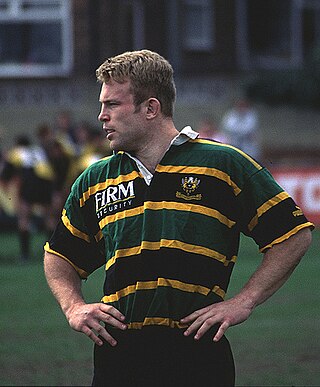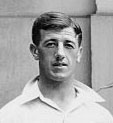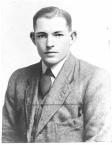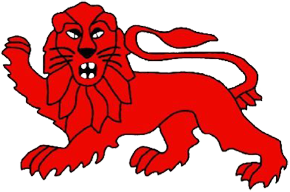Related Research Articles

The British & Irish Lions is a rugby union team selected from players eligible for the national teams of England, Ireland, Scotland, and Wales. The Lions are a test side and most often select players who have already played for their national team, although they can pick uncapped players who are eligible for any of the four unions. The team tours every four years, with these rotating between Australia, New Zealand and South Africa in order. The most recent test series, the 2021 series against South Africa, was won 2–1 by South Africa.

Timothy Andrew Keith Rodber is an English former rugby union footballer who played at Number eight, flanker or lock for Northampton Saints, England, and the British and Irish Lions.

St. Andrew's College is an Anglican high school for boys located in Makhanda (Grahamstown), Eastern Cape province of South Africa. It was founded in 1855 by the Right Reverend John Armstrong, the first Bishop of Grahamstown. It is a semi-boarding school, with a number of day boys. St. Andrew's College caters to 480 pupils from around the globe. The school is also a member of the G30 Schools group and closely associated with its brother school, St. Andrew's Preparatory School, and its sister school the Diocesan School for Girls.

Rhys Haydn Williams, born in Cwmllynfell, was a Welsh rugby union lock forward who gained 23 caps for Wales and ten consecutive caps for the British Lions. At club level he played primarily for Llanelli RFC, captaining them for a season. He also represented the Barbarians becoming the most capped Welsh representative of the club. In his later life he became a sports administrator, including the role of vice-president of the Welsh Rugby Union. Rugby historian John Griffiths described Williams as "the finest line-jumper in the world" and "the most accomplished British lock of the 1950s".
Henry Melville Taberer was a South African cricketer who played in one Test match in 1902. He was the son of the Revd C. Taberer and was born at a mission station in Keiskammahoek, Cape Province.

Harold Geoffrey Owen Owen-Smith, known as Tuppy Smith, was a South African cricketer who played Test cricket for South Africa and a rugby player who played for and captained the England rugby union team. He was born in Rondebosch, Cape Town, and died at Rosebank, also in Cape Town.
Alfred Ronald Dawson was a rugby union player who was a hooker for Ireland. He was captain of the British Lions rugby union team on their 1959 tour to Australia, New Zealand and Canada.
Maurice John Colclough was an England international rugby union player. He was selected for the 1980 British Lions tour to South Africa and the 1983 British Lions tour to New Zealand, playing in all four internationals each tour. He was a member of the England team that won the Grand Slam in 1980. At the time he played club rugby for Angoulême; he also played for Wasps RFC and Swansea RFC.

Arthur Cooper "Johnnie" Wallace was an Australian rugby union player, a state and national representative three-quarter who captained the Waratahs on 25 occasions in the 1920s as well as representing Scotland early in his career.

Tom Lawton Snr was an Australian rugby union player, a state and national representative five-eighth who made 44 appearances for the Wallabies, played in 14 Test matches and captained the national side on ten occasions.

Jack Bassett was a Welsh international rugby union full back who played club rugby for Penarth. He won 15 caps for Wales and was selected for the 1930 British Lions tour of Australia and New Zealand. He captained the Welsh team on nine occasions.

John Edward Raphael was a Belgian-born sportsman who was capped nine times for England at rugby union and played first-class cricket with Surrey. He was a Barrister by profession and a Liberal politician.

Established in 1950, the East Africa rugby union team is a multi-national rugby union team drawing players from Kenya, Uganda and Tanzania, though the vast majority of these came from Kenya which has traditionally been the strongest rugby playing nation in the region. The team has played against incoming international, representative and club touring sides and it conducted seven tours between 1954 and 1982.
Reginald Cuthbert Mullins was a South African rugby union forward and medical doctor. Mullins played club rugby for Oxford University and played international rugby for the British Isles XV in their 1896 tour of South Africa.
William Thomas Charles Cave was an English international rugby union forward who played club rugby for Cambridge and Blackheath. Cave played international rugby for both the British Isles and England, and was also selected for invitational team the Barbarians.

Jules Omer John Malfroy was a prominent New Zealand lawyer, legal advisor to the British government during the Second World War, and an early twentieth century rugby union international. He is known as one of the "lost lions" due to his participation on the 1927 British Lions tour to Argentina, which, although retrospectively recognised as a Lions tour, did not confer Test status on any of the four encounters with the Argentina national rugby union team.

The Cambridge University Rugby Union Football Club, sometimes abbreviated "CURUFC", is the rugby union club of the University of Cambridge. The team plays Oxford University RFC in the annual Varsity Match at Twickenham Stadium every December.
John Vincent D'Alessio Rowley was a South African-born English cricketer and colonial governor. He was born in Graaff-Reinet, Cape Province, and went to school at St. Andrew's College, Grahamstown. He was later awarded a Rhodes Scholarship to study at Trinity College, Oxford.
Murray Koster is a South African rugby union player from East London, Eastern Cape. He plays for the Sharks franchise as a centre.
Rupert Henry Williamson was an England rugby union international.
References
- ↑ St Andrew's School official site Archived 25 January 2009 at the Wayback Machine
- ↑ Tom Gubb profile on scrum.com
- ↑ Thomas Gubb's grave
- ↑ David Walmsley (Author), Robby Elson (Editor), The Lions: The Complete History of the British and Irish Rugby Union Team, Genesis Publications (2005) ISBN 0-904351-96-3
- 1 2 3 4 5 6 7 Who's who of Southern Africa, Vols. for 1967–70 include as a section: Who's who of Rhodesia, Mauritius, Central and East Africa, Argus Printing & Publishing Co., 1974
- ↑ cricketworld.com Archived 2 December 2013 at the Wayback Machine
- ↑ Thomas Gubb profile on www.cricinfo.com
- 1 2 3 4 Register of Rhodes Scholars 1903 1945 (1950), Publisher: Oxford University Press
- ↑ G. E. Elton, The First Fifty Years of The Rhodes Trust And The Rhodes Scholarships 1903 1953 (1956), Publisher: Basil Black Well
- ↑ The American Oxonian, Volumes 51-52 By Association of American Rhodes Scholars page 4